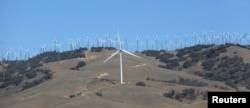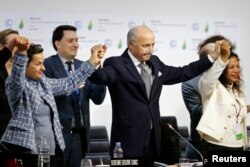Acceptance of the existence of global warming among Americans has reached its highest level in recent years. According to a University of Michigan report, seven out of 10 Americans indicate they believe there is solid evidence of climate change.
On the campaign trail, response to the issue differs wildly depending on party affiliation.
“It is a major part of the conversation in the Democratic side. And, in fact, the recent polling shows that in Iowa specifically and nationally more generally, Democratic voters in the primaries want to hear about [it],” said Gene Karpinski, president of the League of Conservation Voters, a non-partisan environmental advocacy group.
Democratic candidates follow president
Democratic candidates are taking their cues from President Barack Obama, who in the last year alone initiated a clean power plan to cut power plant emissions, rejected a permit for a controversial oil pipeline, promoted renewable energy to boost job growth, and helped forge a new global agreement on climate change.
On a campaign swing through New Hampshire, former secretary of state and democratic presidential contender Hillary Clinton spoke out on renewable energy.
“I think that that’s the best way to combat climate change. It’s also a great way to put millions of people to work. In Iowa, they’re already getting about one-third of their electricity from wind, and we can do the same across America.”
In another campaign event, Clinton’s rival for the nomination, Vermont Senator Bernie Sanders, accused Republicans of siding with donors over voters.
“And if we do not act boldly and decisively, a bad situation will become worse. It’s amazing to me, and I think we’ll have agreement on this up here, that we have a major party, called the Republican Party, that is so owned by the fossil fuel industry and their campaign contributions that they don’t even have the courage, the decency to listen to the scientists.”
Republicans historically are strong environmentalists
Historically, the Republican Party has had strong environmental advocates.
Today, the dominant voice on the environment among Republicans comes from young adults. A Rock the Vote Survey finds they believe climate change is real and want action to curb it. Eighty-one percent of millennials — ages 18-34 — from both parties agree that America should transition to clean energy by 2030.
Karpinski asserts Republican candidates are ignoring this message.
“The two leading candidates right now on the Republican side, Mr. Trump and Mr. Cruz, still say climate change is a hoax,” he said.
Others say that some candidates, like Ohio Governor John Kasich, downplay the issue. During a CNN Republican debate in December, Kasich objected to the Paris conference that led to a global climate change accord.
“And when I see they have a climate conference over in Paris, they should have been talking about destroying ISIS because they are involved in virtually every country, you know, across the world,” he said.
Environment not playing as top issue among Republicans
Ben Zycher, an energy analyst with the American Enterprise Institute, a conservative policy think tank, says Republican candidates are not speaking out on the environment because it is not important for voters.
“If you look at the polling for the electorate at large, it is very low on the list of topics that voters are interested in," he said. "It’s even lower among independents, and even lower among Republicans.”
Karpinski said that while the climate change issue could make a difference in the general election, what is needed is leadership.
“We need bi-partisan support. In the public there is bi-partisan support, but the leadership sadly in the Republican Party is not there,” he said.
Most polls say voters are more concerned about terrorism and the economy. Awareness of climate change is growing, though, and it likely will become more important over time.







